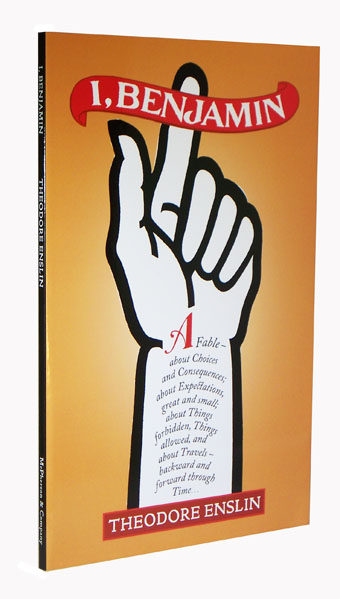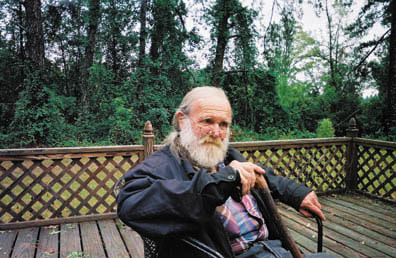- Novels & Novellas
- >
- I, Benjamin
I, Benjamin
SKU:
1905
$10.00
$10.00
Unavailable
per item
Author: Enslin, Theodore
Binding: Paperback, 64 pages, 5.5 x 8.5", 5-1/2 x 8-1/2", 2010, 978-0-929701-90-5
Finalist: 2010 ForeWord Book-of-the-Year Award — Fantasy Fiction
A lonely man possessing special powers crosses into an unknown country. There he meets three mysterious figures: an alluring diva, a shape-shifting siren, and an oddly omniscient hunter. Gradually, the four-part variations of I, Benjamin assume the disquieting dimensions of a visionary passageway to that unknowable thing called a beautiful life. Theodore Enslin's poetic career spanned 51 years from the publication of his first book, The Work Proposed in 1958 to his self-proclaimed swan song, in which he presented a "quasi-autobiographical" fable of an artist's coming-of-age.
To read a sample of the text, go to the link below.
Binding: Paperback, 64 pages, 5.5 x 8.5", 5-1/2 x 8-1/2", 2010, 978-0-929701-90-5
Finalist: 2010 ForeWord Book-of-the-Year Award — Fantasy Fiction
A lonely man possessing special powers crosses into an unknown country. There he meets three mysterious figures: an alluring diva, a shape-shifting siren, and an oddly omniscient hunter. Gradually, the four-part variations of I, Benjamin assume the disquieting dimensions of a visionary passageway to that unknowable thing called a beautiful life. Theodore Enslin's poetic career spanned 51 years from the publication of his first book, The Work Proposed in 1958 to his self-proclaimed swan song, in which he presented a "quasi-autobiographical" fable of an artist's coming-of-age.
To read a sample of the text, go to the link below.
Also available from:
-
Reviews
-
The Author
-
Sample Text and Other Links
<
>
Read John Olson's lengthy review: Exit from Exurbia
"Enslin writes himself a life, a melodious, ideal and legendary one, a dream life that comes to the man-child when he decides to make art his life. This tale is charming, and is, besides, a marvelous recipee for making oneself a life out of words. The reader roams this confined paradise until it suddenly opens, and then one wants to stay." — Andrei Codrescu
"Enslin's story, a pilgrimage from 'Exurbia' to solitary life in the woods and his subsequent journey back, is reminiscent of Thoreau. The narrative, which approaches allegory, oscillates between a dreamy sublimity and Spartan intention. Running through this ethereal story are more austere currents: the limitations of time and body, and the despair of loneliness. Fans of the poet will of course be fascinated by the journey, but more broadly, this exploration offers an intriguing sojourn to those interested in metaphysical travel or in the life cycle of an artist." --ForeWord Reviews (April 2010), Jen Sperry-Steinorth
"There are many choices and routes through life and few of them are ever clear. I, Benjamin is the story of a traveler with unique abilities, and the choices he makes as he encounters others like him along his journey. Faced with the unknown, author Theodore Enslin hopes to discuss our choices and the unknown thoroughly in his writing. I, Benjamin is a poignant and recommended read." — Midwest Book Review
"Life and death, love and loss, alienation, the meaning of existence, and the ephemerality of all the above are covered in avant-garde poet Theodore Enslin's dreamlike fable I, Benjamin, the tale of a man's journey through a mysterious, mercurial world. The thin tome ventures into Siddhartha territory, but no need for Cliffs Notes. It's 61 pages of lyrical, thought-provoking writing." — Ben Minton, Shelf Unbound
"Enslin writes himself a life, a melodious, ideal and legendary one, a dream life that comes to the man-child when he decides to make art his life. This tale is charming, and is, besides, a marvelous recipee for making oneself a life out of words. The reader roams this confined paradise until it suddenly opens, and then one wants to stay." — Andrei Codrescu
"Enslin's story, a pilgrimage from 'Exurbia' to solitary life in the woods and his subsequent journey back, is reminiscent of Thoreau. The narrative, which approaches allegory, oscillates between a dreamy sublimity and Spartan intention. Running through this ethereal story are more austere currents: the limitations of time and body, and the despair of loneliness. Fans of the poet will of course be fascinated by the journey, but more broadly, this exploration offers an intriguing sojourn to those interested in metaphysical travel or in the life cycle of an artist." --ForeWord Reviews (April 2010), Jen Sperry-Steinorth
"There are many choices and routes through life and few of them are ever clear. I, Benjamin is the story of a traveler with unique abilities, and the choices he makes as he encounters others like him along his journey. Faced with the unknown, author Theodore Enslin hopes to discuss our choices and the unknown thoroughly in his writing. I, Benjamin is a poignant and recommended read." — Midwest Book Review
"Life and death, love and loss, alienation, the meaning of existence, and the ephemerality of all the above are covered in avant-garde poet Theodore Enslin's dreamlike fable I, Benjamin, the tale of a man's journey through a mysterious, mercurial world. The thin tome ventures into Siddhartha territory, but no need for Cliffs Notes. It's 61 pages of lyrical, thought-provoking writing." — Ben Minton, Shelf Unbound
|
Ted Enslin was born in Chester, Pennsylvania. His father was a noted biblical scholar and his mother a teacher of Latin. He studied musical composition at Cambridge, Massachusetts with Nadia Boulanger, who recognized his ability as a writer and encouraged him to pursue his interest in poetry. He has said "I like to be considered as a composer who happens to use words instead of notes." His first book, The Work Proposed, was published by Origin in 1958.
Enslin moved to Maine in 1960 and lived in Washington County until his death in 2012, working at odd jobs and making and selling handmade walking sticks. The Maine landscape forms an integral part of his poetry, as does the isolation, both geographic and in terms of distance from literary fashion and the academy. Ranger (1978) is regarded as one of the key American long poems of the second half of the 20th century. GUARDIAN OBITUARY, 2012: Poet whose lines were inspired by musical composition |


